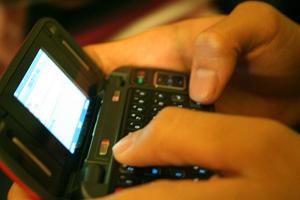Pakistan set to require telecom companies to block messages from a bizarre word list
Pakistani officials are poised to require telecom companies in their country to block text messages containing any one of 1500 words from a bizarre list of banned words. (Photo from Wikipedia Commons.)
Story from PRI’s The World. Listen to the above audio for a complete report.
Authorities in Pakistan are set to implement a plan that they say will clamp down on unsolicited spam mobile phone text messages.
They have compiled a list of 1500 words and ordered telecom companies to filter all text messages containing any of them.
The order and the list of words have become a target of both ridicule and criticism.
The list is so bizarre as to be laughable.
Ass Puppies, Axing the Weasel, Athlete’s Foot, Backdoor man, Barely Legal, Barf-Face, Big Butt, Cyber Slimer, Finger Food, Gonnorhea, Harder, Flatulence, Deposit and Fondle. That’s just some of them. Others are decidedly more profane. You can view the entire list, though its accuracy has not been confirmed by Pakistanis.
There are over 1,500 English and Urdu words that the Pakistan Telecommunication Authority, or PTA, wants banned from text messages.
According to a leaked PTA directive, the aim is to clamp down on bulk messages that are “harmful, fraudulent, illegal or unsolicited.”
But the list has been criticized for its contents. It is, for the most part, a very comprehensive compilation of curse words – some actually very foul, others bizarre and beyond obscure.
The list of Urdu words is crazier than the English one. One of the banned Urdu phrases roughly translates to “The sweat of a lizard’s pubic hair.”
Another translates as “the outcome of a burst condom”.
No, there is nothing lost in translation here – the phrase sounds just as ridiculous in Urdu as it does in English. It’s hard to imagine why and how such phrases would ever be used.
The English list also bans the use of the word “Wu-Tang” … as in the Clan.
With almost a 109 million mobile phone users in Pakistan, this directive could potentially affect many people, whether or not they’re fans of the Wu-Tang Clan.
“If you look at from a child’s point of view may be their needs to be some moderation of what or children are being exposed to. But overall I think no,” said Shahzad Ahmad, who heads Bytes For All, a human rights group that focuses on digital privacy and freedom of expression issues. “I don’t think we need to be mothered really. What else is freedom of expression all about? I think it’s really discomforting.”
Ahmad said he can’t understand where the list will end.
The group is planning legal action against the move. He worries that, ridiculous as the list may be, Pakistani officials have an ulterior motive.
“Since 2006, when Pakistan first started censoring cyberspace, they used to claim it was in the name of blasphemous content, of national security, of fighting the war on terror,” Ahmad said. “But, we always found a political reason underneath all these different bans and censorship that was imposed on the Internet or on the digital communication sphere in Pakistan.”
The directive is set to start being enforced Nov. 21.
Texters are already discussing how to get around the ban. One suggestion is using numbers instead of words. Each banned word has a number on the list.
———————————————————-
PRI’s “The World” is a one-hour, weekday radio news magazine offering a mix of news, features, interviews, and music from around the globe. “The World” is a co-production of the BBC World Service, PRI and WGBH Boston. More about The World.
